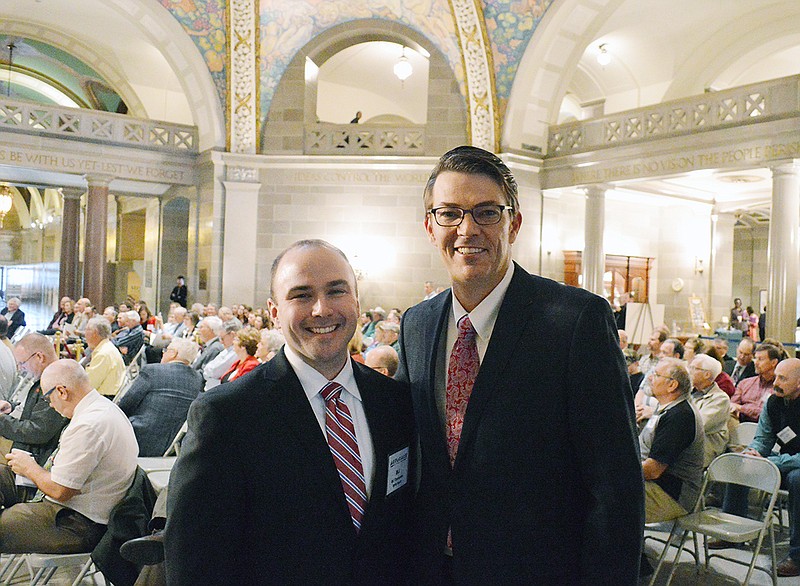Hundreds of farmers and ranchers arrived at the state Capitol on Tuesday afternoon to lobby lawmakers about issues of importance to agricultural and rural communities during Missouri Farm Bureau Federation's annual legislative day.
The Missouri Farm Bureau serves its members by providing insurance, brokerage services and agricultural marketing.
Members met about noon at the bureau headquarters in Jefferson City, where lobbyists briefed them on key issues concerning rural Missourians, particularly those involved in agriculture. They took buses to the Capitol, where they held a rally and met with lawmakers.
B.J. Tanksley, the organization's director for state and legislative affairs, said there are three big issues which concern members - receiving broadband internet in rural parts of the state, property rights and transportation funding.
Roads and highways through rural Missouri are in dire need of improvements, he said.
"We're open to anything in terms of funding," Tanksley said. "The easiest way is a new gas tax. At this point, we support that idea."
The advent of fuel-efficient vehicles and low fuel prices have combined to reduce revenue necessary for maintaining old and building new roads and bridges, he said.
Senate President Pro Tem Ron Richard, R-Joplin, told more than 200 people gathered in the Capitol Rotunda that legislators are aware of their worries and getting broadband to them is a priority.
But questions arise about how to fund transportation improvements, Richard said.
"Is there a fix?" he asked listeners. "Who knows? Transportation has been talked about for the 16 or 18 years I've been here."
Richard is completing his last term as a state senator.
Agriculture remains the No. 1 industry in the state, said House Speaker Todd Richardson, R-Poplar Bluff.
"We're remaining focused on really a singular mission," Richardson said. "And that is: How do we make Missouri one of the most competitive economic environments you'll find anywhere in the country?"
In doing that, the General Assembly has to keep in mind the issues which are "critical" to rural Missouri, he said.
He said House Bill 1880 has had a second reading and been passed on to the Senate. The bill would encourage agreements between various parties and rural electric cooperatives to expand rural broadband services.
During a break between speakers, Tanksley encouraged the Farm Bureau's members to speak to their legislators about another broadband internet bill working its way through the General Assembly.
He said HB 1872 has some worthwhile points and falls short in others. The bill would establish a Missouri Rural Broadband Development Fund, using appropriated money, gifts, contributions and grants to build the fund. The fund would be used to build broadband access in rural areas, according to its summary.
The bill calls only for 10-megabytes-per-second download speed and 1-megabyte-per-second upload speed, Tanksley said. That would be fine for many household uses, but for agricultural and commercial uses, it's far too slow, he added - a minimum acceptable level is 25/3.
Rural broadband in Missouri should reflect what legislators in Minnesota approved. There, although a commission set up to study the state's needs ruled 4/1 was considered broadband, it also determined the benchmark was "dated and inadequate," according to PC Magazine. Instead, the committee recommended 25/3.
"We think this is the direction the state should be going," Tanksley said. "If we're going to spend state funds on helping broadband get to our rural areas, we should be sure that that broadband it funds is sustainable - is future-proof."
Ron Hardecke, an Owensville cattle farmer watching from the audience, said the farming industry continues to embrace technology.
"A lot of our marketing - and other things - are done electronically," Hardecke said.
State Sen. Mike Kehoe, R-Jefferson City, told listeners he relates with the farmers and ranchers.
People don't understand what farmers and their families go through every day, so consumers can walk into a store and find fresh food products on a shelf.
Kehoe, who is also a cattle farmer, has trudged through the mud and spread hay on the snow.
He said he learned from a farm girl years ago that farmers don't just know their neighbors, they help their neighbors.
He also said he's proud to be with people who jump in and help neighbors move their cattle and hay when the water starts to rise.
"I'm so proud to be a part of a family that thinks that way and lives that way," Kehoe said.

